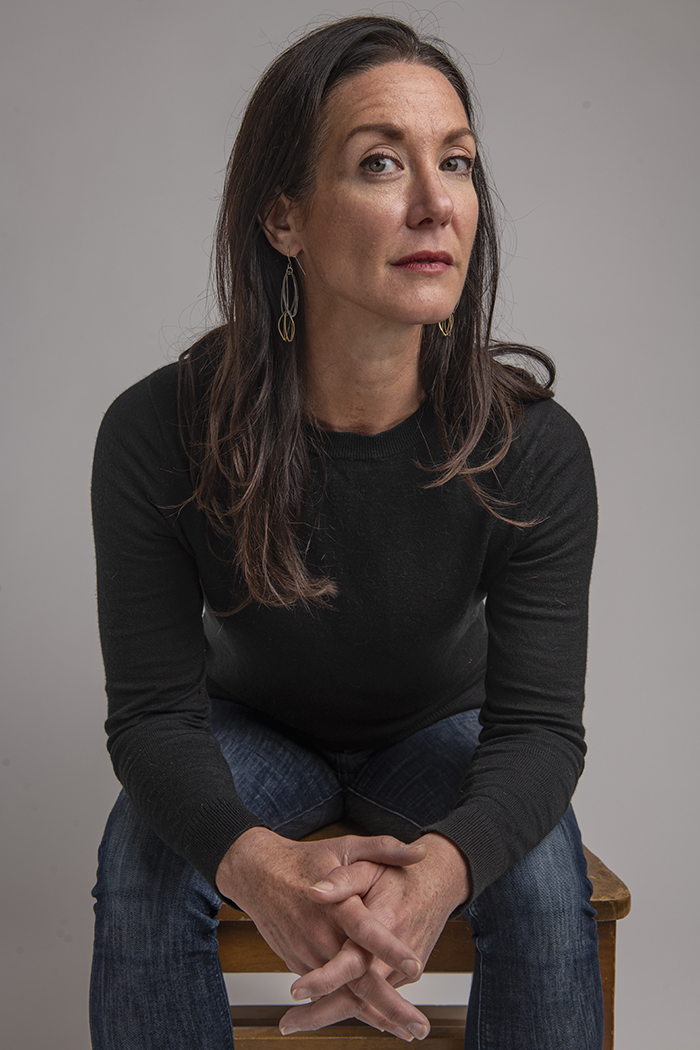- Editorial Offices
- 203 Brantly Hall
- Missoula, MT 59812
- (406) 243-2488
- themontanan@umontana.edu
Justice For All
The new director of the Montana Innocence Project has a UM law degree, a gift for fundraising and a lifelong commitment to racial and social justice.
When news broke in late May of the police killing of George Floyd in Minneapolis, Amy Sings In The Timber felt simultaneously outraged and lost. She had recently moved from Chicago back to Missoula, where she was raising her 10-year-old son and 7-year-old daughter. The pandemic had her working from home and coordinating her kids’ remote learning. Now the country, the world even, was erupting in protest.
On top of it all, Sings In The Timber, 45, had a new job, one that was immediately relevant to the inequities within the U.S. criminal justice system. In January she had been named the new director of the Montana Innocence Project. From this perspective, the racial reckoning sweeping the nation was a moment of clarity.
“Dismantling systemic racism should be fundamental to the work of innocence programs,” Sings In The Timber says. “Many times it is the barrier between innocence and justice for Black, Indigenous and people of color in the criminal justice system.”
In Montana, Native Americans are the most disproportionately incarcerated racial group. Native Americans comprise just 6.6% of the population, but account for almost a third of the inmates in the state prisons.
“By and large, society thinks that if you are in prison, you must have done something wrong,” Sings In The Timber says. “We provide free legal and investigative services to individuals seeking to prove their innocence. Many of them have been given up on and forgotten.”
Together with student interns, volunteers and pro-bono attorneys, the Montana Innocence Project pores through roughly 150 cases each year to uncover any wrongdoing, mistakes or oversights that may prove an inmate’s innocence. Since 2008, MTIP has exonerated seven people. The nonprofit, based in UM’s Alexander Blewett III School of Law, is also helping prevent wrongful convictions through supporting Legislation that requires better access to DNA, for example, and recorded police interrogations.
Now, amidst a global pandemic and unprecedented racial upheaval, it’s Sings In The Timber’s job to raise the money, lobby the legislature and enable her staff to ensure that justice in Montana is accessible to everyone, equally.
Sings In The Timber was born and raised in Milwaukee, a descendant of the Lac du Flambeau Band of Lake Superior Chippewa. She’s no stranger to activism. As a young adult, she advocated for tribal treaty rights and protested offensive Native mascots in professional sports.
But before her career in social justice, Sings In The Timber was an artist. She enrolled in the Milwaukee Institute of Art & Design as a fine art painting major. From there she transferred to the University of Wisconsin, where she double-majored in anthropology and Native American studies. During an internship at the Milwaukee Public Museum, Sings In The Timber worked on cultural artifacts classified under the Native American Graves Protection and Repatriation Act, a piece of legislation that intrigued her.
To learn more about the law, she became a volunteer paralegal at the campus legal clinic and realized she wanted to become a lawyer. This willingness to try her hand at anything is a theme in Sings In The Timber’s life. After college she even spent two years teaching kindergarten at the Indian Community School in Milwaukee.
By 2002, she knew she wanted to study federal Indian law, so she traveled 1,500 miles west to the University of Montana.
“Honestly it was a huge culture shock,” she recalls. “I didn’t know anybody in Missoula, and I felt pretty isolated.”
Sings In The Timber quickly cobbled together a community of “found family” within the law school. One of these friends was Denise Juneau, now the superintendent of Seattle Public Schools, who was a year ahead of her. After Sings In The Timber graduated in 2005, she went to work with Juneau in the Indian Education Division at Montana’s Office of Public Instruction. Sings In The Timber traveled the state, addressing Native American dropout rates, retention and engagement.
Then, in 2007, Sings In The Timber was hired as the first director of the Montana Justice Foundation, a nonprofit that funds civil legal aid and access to justice initiatives across the state. She attended large meetings with directors of similar organizations from around the country and Canada. Most of those directors were older white men, even though the issues they were discussing primarily affected racial minorities.
Sings In The Timber was inspired by the work, if a little overwhelmed.
“I was learning all of this amazing content and trying to apply it while raising the money to make it all happen,” she says. “And I was a baby lawyer and a woman of color in a very interesting position in the state of Montana. Oh, and I wasn’t a Montanan.”
Sings In The Timber carried MJF through the recession of 2008, a trial-by-fire for her fundraising skills.
“I feel like I’ve been raising money my whole life, but before the MJF it was mostly for student organizations,” she says. “All of a sudden I was learning the art and science of philanthropy. There are generally no bake sales that come up with a quarter million in funding.”
Around this time, Scott Crichton, who directed the American Civil Liberties Union of Montana for 27 years, recruited Sings In The Timber to join the ACLU board. She chaired the development committee and helped raise a good deal of money.
“The challenge of any nonprofit is to fulfill its mission and pay its bills,” Crichton says. “Lots of people are energetic about the mission, but fall flat when it comes to figuring out how to pay for it all. Amy’s capable on all fronts.”
In 2015, Sings In The Timber packed up her young family and moved to Chicago, where she spent five years working in development for the Chicago Bar Foundation and Covenant House, a nonprofit that supports youth experiencing homelessness. All the while she litigated Indian Child Welfare Act cases pro bono, served as guardian ad litem for Indigenous children and represented survivors of sexual assault and trafficking.
Worthy as the work was, Sings In The Timber was putting in 70-hour weeks that kept her from her young children. When she separated from her husband, she knew a change was in order.
“I needed to go back to where I felt whole,” she says. “Funny enough, that was Montana.”
So Sings In The Timber, her children and their pet greyhound drove back to Missoula, where the Montana Innocence Project, serendipitously, was searching for a new director.
Sings In The Timber’s current office occupies what used to be faculty row in the old law school. “Now it’s a lovely new building with a lot of glass and some pretty righteous Native artwork,” she says.
She’s happy to be back. Others are, too. Among them is Dan Weinberg, the former state senator from Whitefish who started MTIP in 2008.
“She’s probably the best qualified director we’ve ever had,” he says. “It’s easier to raise money for ballet lessons and puppies than it is to free the wrongfully convicted. But she’s a successful fundraiser and actually enjoys it.”
Sings In The Timber’s immediate priorities include lobbying the state Legislature to pass a bill that compensates the wrongfully convicted. Many states have such statutes, but in Montana, exonerated inmates leave prison with no money or programming to rebuild their lives. Sings In The Timber also hopes MTIP can help abolish the death penalty in Montana, a major issue for innocence work.
“She has an incredible ability to set a goal and run at it,” says MTIP legal director Caiti Carpenter. “She brings an energy that makes you want to run at her level. You just want to keep up.”
In the wake of George Floyd’s death, Sings In The Timber hopes for Montana what she hopes for the nation: that Black, Indigenous, and people of color would be afforded justice. She’d like to see Montana’s Native communities better represented in boardrooms and political offices than they are in the state’s prisons. And she sees MTIP as an important part of this work.
“We’re in a different moment, “she says. “There’s a real pressure right now that has gained the attention of all generations, colors and socioeconomic statuses. The stakes couldn’t be any higher and the obstacles couldn’t be any greater, but I have to believe that we’ve gotten to this point for a reason.”

Story by : Jacob Baynham
Jacob Baynham graduated from UM with a journalism degree in 2007. He writes for Outside, National Parks, and other magazines. He lives in Missoula with his wife, Hilly McGahan ’07, and their two sons.




